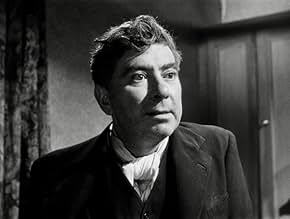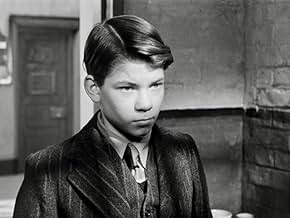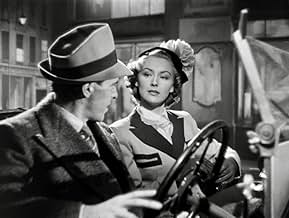अपनी भाषा में प्लॉट जोड़ेंA worthless sailor walks out on his young family leaving them to fend for themselves in the Liverpool slums. They make a go of their lives, but the eldest daughter is not happy when her fath... सभी पढ़ेंA worthless sailor walks out on his young family leaving them to fend for themselves in the Liverpool slums. They make a go of their lives, but the eldest daughter is not happy when her father decides to return.A worthless sailor walks out on his young family leaving them to fend for themselves in the Liverpool slums. They make a go of their lives, but the eldest daughter is not happy when her father decides to return.
Kathleen Boutall
- Mrs. Duncan
- (बिना क्रेडिट के)
John Boxer
- Policeman
- (बिना क्रेडिट के)
Tony Britton
- Deck-Hand
- (बिना क्रेडिट के)
Cyril Chamberlain
- Reporter
- (बिना क्रेडिट के)
Richard Coke
- Pub Customer
- (बिना क्रेडिट के)
फ़ीचर्ड समीक्षाएं
This is one of Michael Anderson's earliest films but already a masterpiece. It is like almost a documentary of very ordinary people living by the docks of Liverpool. The father, Robert Newton, is an irresponsible drunk who goes for the sea for fourteen years without once writing home to his family. His two daughters grow up in the meantime, the eldest taking on the responsibility for the family to make it survive with a father gone without ever sending any money home, but she finds the young Richard Burton, who already here makes a brilliant appearance in one of his first films. The other daughter is more flimsy and gets courted by a cad, Kenneth Grahame, always a pleasure to watch on screen, while the mother, Kathleen Harrison, as good as ever, keeps faithful to her wretched husband in good memory, and the drama begins in half of the film when he suddenly comes home after fourteen years. Nora, the eldest daughter, happens to be alone at home and is shocked to her bones to see him come back in the middle of the great depression, when everyone is out of work and money is more than scarce, and all her reasonable bitterness immediately flares up. He is thrown out, and there the tragedy begins, he not even knowing he has a son who was born after he had left.
It's a very humdrum but gripping drama with the fascinating environment of the Liverpool docks, reminding you of the tense atmosphere In films like "Odd Man Out" and "For Them That Trespass", similar classical down to earth films without any Hollywood lustre. Robert Newton as the pathetic father makes the deepest impression, but all the acting here is first class, giving a perfectly convincing insight into basic life at the old docklands of Liverpool. Adding to the charm is the somewhat striking accompaniment of music by Liszt ("The Preludes" above all.)
It's a very humdrum but gripping drama with the fascinating environment of the Liverpool docks, reminding you of the tense atmosphere In films like "Odd Man Out" and "For Them That Trespass", similar classical down to earth films without any Hollywood lustre. Robert Newton as the pathetic father makes the deepest impression, but all the acting here is first class, giving a perfectly convincing insight into basic life at the old docklands of Liverpool. Adding to the charm is the somewhat striking accompaniment of music by Liszt ("The Preludes" above all.)
'Waterfront' is a short, but beautifully written and acted, British drama. It boasts an early performance from the young Richard Burton, before Hollywood flourishes and ego started to affect his film choices; and a multi-faceted turn from Robert Newton as the drunken father who returns to the family he abandoned some years before.
Without a complicated plot, this film concentrates instead on the characters - the mother who has grown strong for her children's sake (the excellent Kathleen Harrison); the daughters Nora (Avis Scott) and Connie (Susan Shaw), and other peripheral characters - Olive Sloane as Mrs Gibson, alongside Kenneth Griffith and Robin Netscher.
Directed by Michael Anderson from John Brophy's novel, this gem showcases the Liverpool docks in the days when life was hard for those who lived there and made their living from the water. It looks at the journey from girl to woman of the eldest child, and the muddled dynamics of family relationships and loyalties.
Without a complicated plot, this film concentrates instead on the characters - the mother who has grown strong for her children's sake (the excellent Kathleen Harrison); the daughters Nora (Avis Scott) and Connie (Susan Shaw), and other peripheral characters - Olive Sloane as Mrs Gibson, alongside Kenneth Griffith and Robin Netscher.
Directed by Michael Anderson from John Brophy's novel, this gem showcases the Liverpool docks in the days when life was hard for those who lived there and made their living from the water. It looks at the journey from girl to woman of the eldest child, and the muddled dynamics of family relationships and loyalties.
Given that this film was set in Liverpool what one has to ask is why are the actors all using different accents.For some reason the director clearly equates anywhere up North with a mancunian accent instead of the scouse accent.Of course dear old Robert Newton eyes rolling in anticipation of his part as Long John Silver,veers from Cockney to mumerset.Newton was such a fine actor your attention is drawn to him from beginning to end.He is supported by such a great cast.A very young Richrad Burton as a jobless ships engineer,Kathleen Harrison as the usual harassed mother and Kenneth Griffiths playing what one assumes to be a spiv.The camera work is first class particularly eye catching being the fight outside the pub.One could almost call this a British film noir.This film is sadly neglected and doesn't get any showing on TV.
Robert Newton slings his ditty on his shoulder, tells his elder daughter he's off on another voyage and walks off singing. He's not seen again for more than fourteen years. In the meantime, his wife, Kathleen Harrison, gives birth to his son, who turns out to be a swot. His daughter grow up into Avis Scott and Susan Shaw. Miss Scott gets engaged to Ship's engineer Richard Burton (in his third screen role)m who can't get a berth because of the downturn. Miss Shaw takes up with well-to-do Kenneth Griffith, who's looking for a good time with an easily impressed slum girl, Miss Harrison...well, she is worn out, bewildered, and hopeful.
It's an ambitious film from a novel by John Brophy, directed by Michael Alexander. You can tell by Liszt Prelude conducted by the London Symphony Orchestra that is offered as the opening and closing themes, and the graceful camerawork by Harry Waxman that swoops from the skies to show the dingy, worn-down Merseyside. The problem is, that while always watchable, and always well performed, the characters don't change, just the situations. Some will make their way out by talent, like Robin Netscher as Harrison's son, or by hard work, like Burton and Miss Shaw; some will sink into dust, like Miss Harrison and Miss Shaw. And some will be hanged, like Newton. But they can't change places. This sort of Greek tragedy isn't a story of people, but of fates.
It's an ambitious film from a novel by John Brophy, directed by Michael Alexander. You can tell by Liszt Prelude conducted by the London Symphony Orchestra that is offered as the opening and closing themes, and the graceful camerawork by Harry Waxman that swoops from the skies to show the dingy, worn-down Merseyside. The problem is, that while always watchable, and always well performed, the characters don't change, just the situations. Some will make their way out by talent, like Robin Netscher as Harrison's son, or by hard work, like Burton and Miss Shaw; some will sink into dust, like Miss Harrison and Miss Shaw. And some will be hanged, like Newton. But they can't change places. This sort of Greek tragedy isn't a story of people, but of fates.
I have to wonder if the other reviewers on IMDb were watching the same film I have just seen. Waterfront must have been the most unrealistic "slice of life in the raw" film even upon its release in 1950. Some 64 years on it is simply laughable. Considering the Liverpool docks setting, and the fact that all the characters are meant to be local, it is incongruous to say the least that Ma is played by the Cockney sparrer herself, Kathleen Harrison, whilst her daughters are Susan Shaw (doing her It Always Rains on Sunday "EastEnders" bad girl accent), Avis Scott (who she?) at least attempting something vaguely Lancastrian - but certainly not Liverpudlian), and the two younger male leads are both Welsh - Richard Burton and Kenneth Griffith. Robert Newton opts for a mildly northern twang - occasionally. Newton, Harrison and Shaw are top-billed, though the starring role is actually played by Avis Scott, in what appears to have been her first and last lead (presumably Sally Gray was not available). Waterfront can only be viewed as a period piece, but it is not a good one, and is never for one moment believable or engrossing. Perhaps in the attempt for 'realism', none of the cast inject any personality into their characters: this is the only film in which the usually wonderful Kathleen Harrison has actually gotten on my nerves, and Richard Burton shows no sign of being a megastar in embryo.
क्या आपको पता है
- ट्रिवियाRobert Newton and Richard Burton appear together again three years later in "The Desert Rats" only this time Burton has top billing.
- भाव
Nora McCabe: And that is good chuckance to bad rubbish.
- साउंडट्रैकLes Preludes
Music from Franz Liszt (as Liszt)
Played by London Symphony Orchestra (as The London Symphony Orchestra)
Director of Music Muir Mathieson
टॉप पसंद
रेटिंग देने के लिए साइन-इन करें और वैयक्तिकृत सुझावों के लिए वॉचलिस्ट करें
- How long is Waterfront Women?Alexa द्वारा संचालित
विवरण
- चलने की अवधि1 घंटा 20 मिनट
- रंग
- पक्ष अनुपात
- 1.37 : 1
इस पेज में योगदान दें
किसी बदलाव का सुझाव दें या अनुपलब्ध कॉन्टेंट जोड़ें
































